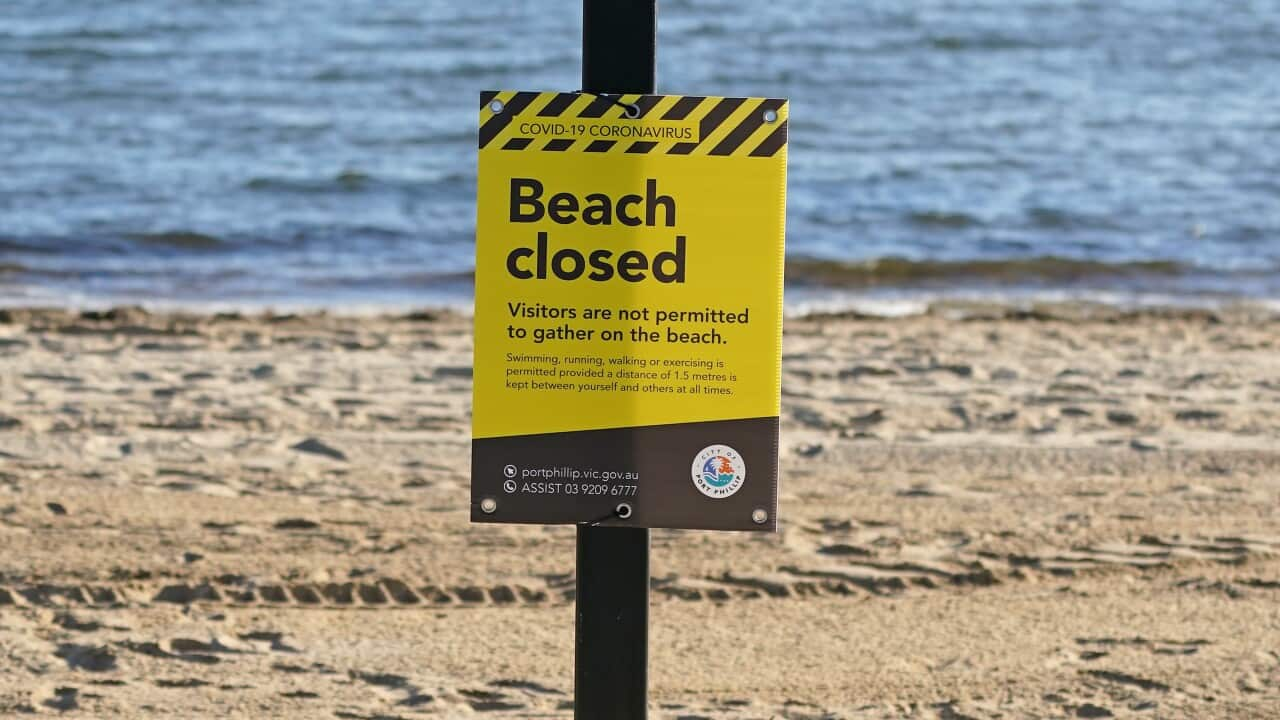Australia is flattening the curve and some restrictions are easing. The federal government announced that from next week the ban on elective surgery will gradually ease, while in New South Wales some beaches are being re-opened.
Experts warn that numbers falling does not mean normal life will resume.
"There is great concern, that if we relax too much too quickly, we could get a second wave as seen in Singapore," Australia's chief medical officer Brendan Murphy said at a parliamentary inquiry into the government's response to the COVID-19 pandemic on Thursday.
"We certainly would not be contemplating large scale gatherings -- certainly some relaxation of the size of small groups is possible."
Murphy says re-opening Australia's borders for international travel would be the last restriction to be lifted.
Dr Kathryn Snow is an infectious disease epidemiologist at the University of Melbourne, and agrees with Murphy. She told The Feed crowded indoor events are high risk for coronavirus spread.
"There was a conference in the US where three people walked in with the virus, and 70 people walked out with the virus," Dr Snow said.
"We've had weddings where there's been 30 to 50 cases associated with one wedding and one person at the wedding with the virus. So those types of events are quite high risk."
What are the risks hanging out with friends?
At present, you can't. Social gatherings are limited to two people, or people within your household. If restrictions are eased this could be a low risk activity, according to Dr Snow.
"If you had a situation where four people met up for a picnic in a park, if they're outside, they don't shake hands, they don't kiss each other hello, they don't mix up any glasses, no one's sick and no one's coughing, then that's reasonably low risk," Dr Snow said.
"The worry would be though that if you lifted that restriction and people had a house party inside with 20 people and people were hugging and kissing hello, mixing up glasses, and somebody was unwell, then that could be a really high risk event."
Even if there are no out of control house parties and everyone keeps a distance, there is still risk, according to Dr Snow.
"In Australia, one sort of famous case now is 14 people had dinner together, one of them had the virus, and they gave it to every single other person who was present in a matter of hours," she said.
"And that was just sitting around a couple of tables having dinner together. So even those small gatherings can actually still be quite high risk in some circumstances, unfortunately."
What are the risks going on a camping trip?
This could be perceived as low risk: it's outdoors and campers can maintain social distancing. But this activity could have an unintended fallout.
"What happens if someone falls hiking and breaks their leg and has to be transferred to a regional Hospital?" Dr Snow said.
"A lot of small towns, at the moment, are concerned about people coming in from outside to go camping or go hiking or go surfing or whatever in the local area.
"Because they are small places and are tight knit communities and they often only have one GP in the town."
What are the risks going back to the office?
Only essential workers are allowed to continue work in their offices. Dr Snow says there's quite a bit of risk if the majority of workplaces are to go back to their physical workplaces, particularly open plan offices.
"We think most transmission of this virus happens from people who are spending a lot of time together, and in close proximity to each other," she said.
"So that's people who are like sitting next to each other in an open plan office or sharing a small office. There could also potentially be a risk from people sharing bathrooms and sharing kitchens."
Twenty people in a lift at eight o'clock in the morning? Dr Snow points to this scenario as a cause for concern.
"I think workplaces will need to think about it in terms of people safely coming back to work," she said.
What should you do if restrictions are relaxed?
Dr Snow says we need cultural change around Australia to deal with even the potential of relaxed restrictions.
"I'm always amazed how many people will come to a social event and hug me hello and then when I ask how they are they say 'oh I'm a bit sick actually'," she said.
"If you are the slightest bit sick you really need to stay at home. If these restrictions are lifted and small gatherings are allowed in future, or a lot of us are allowed to go back to work. It's so important that we don't go to social events or don't go to work if we're sick, even if we are only a little bit sick.
"Because what might just be a bit of a cough for me could be extremely serious to some of my older colleagues or other older people who are vulnerable."
People in Australia must stay at least 1.5 metres away from others and gatherings are limited to two people unless you are with your family or household.
If you believe you may have contracted the virus, call your doctor (don't visit) or contact the national Coronavirus Health Information Hotline on 1800 020 080. If you are struggling to breathe or experiencing a medical emergency, call 000.
SBS is committed to informing Australia's diverse communities about the latest COVID-19 developments. News and information is available in 63 languages at sbs.com.au/coronavirus.
Share
Through award winning storytelling, The Feed continues to break new ground with its compelling mix of current affairs, comedy, profiles and investigations. See Different. Know Better. Laugh Harder. Read more about The Feed
Have a story or comment? Contact Us





